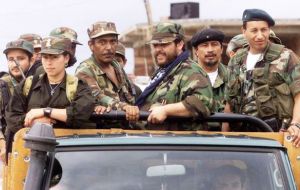MercoPress. South Atlantic News Agency
Colombia's FARC expels five commanders who rejected demobilization; fears they will turn to criminal gangs
 “We call on all combatants who have been tricked into this futureless path to distance themselves from this mistaken decision taken by their commanders”
“We call on all combatants who have been tricked into this futureless path to distance themselves from this mistaken decision taken by their commanders” Colombia's FARC rebels have expelled five commanders for refusing to demobilize and join a peace process with the government aimed at ending more than five decades of war, guerrilla leadership said. The five commanders, all from units in the country's southeast jungle, include one former participant in four-year-long peace talks in Cuba.
“This decision is motivated by their recent conduct, which contradicts our political-military line,” leaders of the Revolutionary Armed Forces of Colombia (FARC) said in statement late on Tuesday.
“We call on all combatants who have been tricked into this futureless path to distance themselves from this mistaken decision taken by their commanders,” the statement said.
The expelled commanders are the second group of rebels to declare their opposition to the peace deal under which the FARC convert into an unarmed political party. In July a First Front unit leader and some of his fighters left the group in protest of the deal.
Law enforcement and military officials have expressed fears some rebels will not demobilize and will instead keep control of lucrative coca-growing and cocaine-smuggling operations, joining the ranks of the country's feared criminal gangs.
A modified peace deal, cobbled together after the first version was rejected in a public vote in October, has been signed by FARC leader Rodrigo Londono and President Juan Manuel Santos, who won the Nobel Peace Prize for his efforts to reach an accord.
The deal has been approved by Colombia's Congress and some 7,000 rebels now have six months to move to demobilization zones and hand in all weapons. It is so far unclear whether the second deal will have to go to another public vote.




Top Comments
Disclaimer & comment rulesCommenting for this story is now closed.
If you have a Facebook account, become a fan and comment on our Facebook Page!